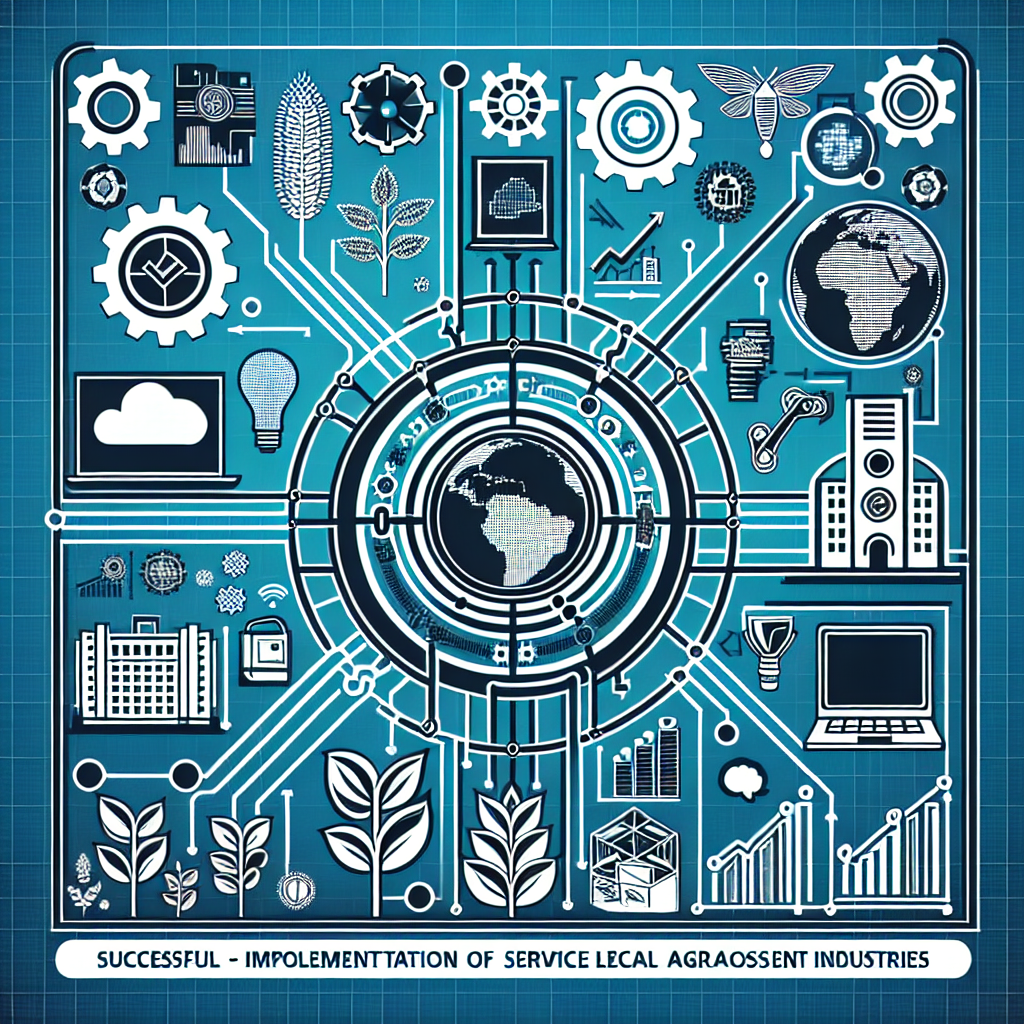Your cart is currently empty!
Tag: Service

How Managed Service Providers Can Help Streamline Your Business Operations
In today’s fast-paced business environment, managing and maintaining IT infrastructure can be a daunting task. This is where managed service providers (MSPs) come in. MSPs are third-party companies that take care of all your IT needs, from network monitoring to security management, allowing you to focus on your core business operations.One of the biggest advantages of working with an MSP is that they can help streamline your business operations. Here are some ways in which MSPs can help make your business more efficient and productive:
1. 24/7 Monitoring and Support: MSPs provide 24/7 monitoring of your IT infrastructure, ensuring that any issues are detected and resolved promptly. This helps minimize downtime and keeps your business running smoothly.
2. Proactive Maintenance: MSPs can also help with proactive maintenance of your IT systems, ensuring that potential problems are identified and addressed before they escalate into major issues. This helps prevent costly downtime and disruptions to your business operations.
3. Security Management: Cybersecurity is a major concern for businesses of all sizes. MSPs can help ensure that your IT systems are secure and protected from cyber threats. They can implement security measures such as firewalls, antivirus software, and intrusion detection systems to keep your data safe.
4. Scalability: As your business grows, your IT needs will also evolve. MSPs can help scale your IT infrastructure to meet the changing requirements of your business. Whether you need to add more storage capacity or upgrade your network, MSPs can help ensure that your IT systems can accommodate your growing business.
5. Cost Savings: Working with an MSP can also help save costs for your business. Instead of hiring and training an in-house IT team, you can outsource your IT needs to an MSP for a fixed monthly fee. This can help reduce overhead costs and free up resources for other areas of your business.
Overall, managed service providers can play a crucial role in streamlining your business operations and improving efficiency. By outsourcing your IT needs to an MSP, you can focus on growing your business and achieving your strategic objectives. If you haven’t already considered working with an MSP, now may be the time to explore this option and see how it can benefit your business.
How to Create Effective Service Level Agreements for Your Company
Service Level Agreements (SLAs) are essential documents that outline the expectations and responsibilities between a service provider and a client. They ensure that both parties are on the same page regarding the level of service that will be provided and help to prevent misunderstandings or disputes in the future. Creating effective SLAs for your company is crucial for maintaining good relationships with clients and delivering high-quality service. Here are some tips on how to create effective SLAs for your company:1. Understand the needs and expectations of your clients: Before drafting an SLA, it is important to have a clear understanding of your clients’ needs and expectations. This will help you tailor the SLA to meet their specific requirements and ensure that you are able to deliver on your promises.
2. Define the scope of services: Clearly outline the scope of services that will be provided, including the specific tasks and responsibilities that are included in the agreement. This will help to prevent any misunderstandings about what is and is not covered under the SLA.
3. Set measurable performance metrics: Include specific performance metrics in the SLA that can be easily measured and monitored. This could include things like response times, resolution times, and uptime guarantees. Setting measurable metrics will help to ensure that both parties are able to track and evaluate the level of service being provided.
4. Establish consequences for non-compliance: It is important to include consequences for non-compliance with the SLA, such as penalties or termination of the agreement. This will help to incentivize both parties to meet their obligations and ensure that the SLA is taken seriously.
5. Include a process for resolving disputes: It is important to include a process for resolving disputes in the SLA, including how issues will be escalated and resolved. This will help to ensure that any conflicts are addressed in a timely and efficient manner, minimizing the impact on the client.
6. Review and update regularly: SLAs should be reviewed and updated regularly to ensure that they continue to meet the needs of both parties. As the business environment and client requirements evolve, it is important to make any necessary adjustments to the SLA to reflect these changes.
In conclusion, creating effective SLAs for your company is essential for maintaining good relationships with clients and delivering high-quality service. By understanding the needs and expectations of your clients, defining the scope of services, setting measurable performance metrics, establishing consequences for non-compliance, including a process for resolving disputes, and regularly reviewing and updating the SLA, you can ensure that your company is able to meet its obligations and provide excellent service to clients.

Choosing the Best Managed Service Provider for Your Industry
In today’s fast-paced business world, staying ahead of the competition requires more than just having a great product or service. It also means having a reliable and efficient IT infrastructure in place to support your operations. For many companies, this means partnering with a managed service provider (MSP) to handle their IT needs.Choosing the right MSP for your industry is crucial to the success of your business. With so many options available, it can be overwhelming to sift through the choices and find the one that will best meet your needs. Here are some key factors to consider when selecting an MSP for your industry:
1. Industry Experience: One of the most important factors to consider when choosing an MSP is their experience in your specific industry. Look for a provider that has a track record of working with companies in your sector and understands the unique challenges and requirements that come with it.
2. Services Offered: Different MSPs offer different services, so it’s important to assess your needs and find a provider that offers the services that are most relevant to your business. Some common services provided by MSPs include network monitoring, data backup and recovery, cloud services, and cybersecurity.
3. Scalability: As your business grows, your IT needs will also evolve. Make sure the MSP you choose has the capacity to scale their services to accommodate your growth. This includes the ability to quickly add or remove users, upgrade hardware and software, and adjust service levels as needed.
4. Security Measures: With cyber threats on the rise, security is a top concern for businesses of all sizes. Look for an MSP that has robust security measures in place to protect your data and systems from potential breaches. This includes regular security audits, encryption protocols, and employee training on cybersecurity best practices.
5. Customer Support: When something goes wrong with your IT systems, you need a provider that is responsive and reliable. Look for an MSP that offers 24/7 customer support and has a track record of quickly resolving issues. A good provider will also proactively monitor your systems to identify and address potential problems before they escalate.
In conclusion, choosing the best managed service provider for your industry is a critical decision that can have a significant impact on the success of your business. By considering factors such as industry experience, services offered, scalability, security measures, and customer support, you can find a provider that will help you stay ahead of the competition and achieve your business goals.

The Importance of Service Level Agreements (SLAs) in Business
Service Level Agreements (SLAs) are crucial for businesses as they define the level of service expected from a service provider. These agreements outline the responsibilities of both parties and ensure that expectations are clearly communicated and met. Here are some key reasons why SLAs are important in business:1. Defines Expectations: SLAs clearly outline the services to be provided, the metrics by which they will be measured, and the responsibilities of both parties. This helps to prevent misunderstandings and ensures that both parties are on the same page regarding the level of service expected.
2. Ensures Accountability: SLAs hold service providers accountable for meeting the agreed-upon performance standards. If the service provider fails to meet the agreed-upon service levels, the SLA provides a basis for recourse, such as penalties or termination of the agreement.
3. Improves Communication: SLAs facilitate open communication between the service provider and the customer. By clearly defining expectations and responsibilities, SLAs help to avoid miscommunication and ensure that both parties are aligned on the goals and objectives of the service.
4. Drives Performance: SLAs provide a framework for measuring and monitoring the performance of the service provider. By setting specific performance metrics and targets, SLAs motivate service providers to continuously improve their performance and deliver high-quality service.
5. Enhances Customer Satisfaction: SLAs help to ensure that customers receive the level of service they expect. By setting clear expectations and holding service providers accountable for meeting those expectations, SLAs help to build trust and confidence with customers, leading to higher levels of satisfaction and loyalty.
6. Mitigates Risks: SLAs help to mitigate risks by establishing clear guidelines for service delivery and performance. By outlining the consequences of failing to meet the agreed-upon service levels, SLAs help to protect both parties from potential disputes and financial losses.
In conclusion, Service Level Agreements are essential in business as they define expectations, ensure accountability, improve communication, drive performance, enhance customer satisfaction, and mitigate risks. By establishing clear guidelines for service delivery and performance, SLAs help to build strong and successful partnerships between service providers and customers. Businesses that prioritize SLAs are more likely to deliver high-quality service, meet customer expectations, and achieve long-term success.

Scaling Your Business with Managed Service Providers: Strategies for Growth and Success
In today’s fast-paced and ever-changing business landscape, scaling your business is crucial for long-term success and sustainability. One effective way to achieve this is by partnering with managed service providers (MSPs) who can help streamline your operations, reduce costs, and drive growth.Managed service providers offer a wide range of services, including IT support, cybersecurity, cloud computing, and more. By outsourcing these tasks to an MSP, you can free up valuable time and resources that can be redirected towards strategic initiatives and business growth.
Here are some strategies for leveraging managed service providers to scale your business:
1. Focus on Core Competencies: By outsourcing non-core functions to an MSP, you can focus on what your business does best. This allows you to allocate resources towards innovation, product development, and customer acquisition, driving growth and competitive advantage.
2. Improve Efficiency and Productivity: MSPs are experts in their field and can provide best-in-class services that are tailored to your business needs. By leveraging their expertise, you can improve operational efficiency, reduce downtime, and increase productivity, ultimately leading to business growth.
3. Reduce Costs and Increase ROI: Outsourcing to an MSP can help lower operational costs, as you no longer need to invest in expensive technology and infrastructure. Additionally, MSPs often offer flexible pricing models, allowing you to pay for only the services you need. This can lead to significant cost savings and increased return on investment.
4. Enhance Security and Compliance: Cybersecurity is a growing concern for businesses of all sizes. MSPs can help protect your data and systems from cyber threats, ensuring compliance with industry regulations and safeguarding your business from potential breaches. By partnering with an MSP, you can enhance your security posture and build trust with your customers.
5. Scale on Demand: As your business grows, so do your technology needs. MSPs offer scalable solutions that can grow with your business, ensuring that you have the resources and support you need to meet increasing demands. This flexibility allows you to scale your operations quickly and efficiently, positioning your business for long-term success.
In conclusion, partnering with managed service providers can be a game-changer for scaling your business. By focusing on core competencies, improving efficiency, reducing costs, enhancing security, and scaling on demand, you can position your business for growth and success. With the right MSP partner by your side, the possibilities for scaling your business are endless.

Finding the Right Managed Service Provider for Your Business Needs
In today’s fast-paced business environment, it is essential for companies to stay ahead of the curve when it comes to technology. Managed service providers (MSPs) play a crucial role in helping businesses navigate the complex landscape of IT services and support. Finding the right MSP for your business needs can be a daunting task, but with careful consideration and research, you can find a partner that will help your business thrive.One of the first things to consider when looking for an MSP is the range of services they offer. Not all MSPs are created equal, and it is important to find a provider that can meet all of your business’s IT needs. Some key services to look for include network monitoring, data backup and recovery, cybersecurity, cloud computing, and help desk support. Assess your current and future IT requirements to ensure that the MSP you choose can provide the necessary services to keep your business running smoothly.
Another important factor to consider is the MSP’s experience and expertise in your industry. Different industries have unique IT requirements and regulations, so it is important to find an MSP that has experience working with businesses similar to yours. Look for MSPs that have a proven track record of success in your industry and can provide references from satisfied clients.
Additionally, it is important to consider the MSP’s level of customer support and responsiveness. IT issues can arise at any time, so it is crucial to find an MSP that offers 24/7 support and quick response times. A reliable MSP should be able to address and resolve any IT issues promptly to minimize downtime and keep your business operations running smoothly.
When choosing an MSP, it is also important to consider the scalability of their services. As your business grows, your IT requirements will also evolve, so it is important to find an MSP that can scale their services to meet your changing needs. Look for an MSP that offers flexible service plans and can accommodate your business’s growth without sacrificing quality or reliability.
Finally, consider the cost of the MSP’s services. While it is important to find an MSP that fits within your budget, it is also important to consider the value they provide. Look for an MSP that offers competitive pricing and transparent billing practices, so you know exactly what you are paying for. Remember that investing in quality IT services is an investment in the future success of your business.
In conclusion, finding the right managed service provider for your business needs requires careful consideration and research. By assessing your IT requirements, considering the MSP’s experience and expertise, evaluating their customer support and scalability, and reviewing their pricing, you can find a partner that will help your business thrive in today’s competitive business landscape. With the right MSP by your side, you can focus on growing your business while leaving the IT heavy lifting to the experts.

Case Studies: Successful Implementation of Service Level Agreements in Various Industries
Service Level Agreements (SLAs) are a crucial component of any business relationship, outlining the expectations and responsibilities of both parties involved. By clearly defining the services to be provided, the quality standards to be met, and the consequences for failing to meet those standards, SLAs help ensure that both parties are on the same page and working towards the same goals.In various industries, successful implementation of SLAs has led to improved customer satisfaction, increased efficiency, and stronger partnerships between service providers and their clients. Let’s take a look at some case studies that highlight the successful implementation of SLAs in different industries:
1. IT Services Industry:
A leading IT services company implemented SLAs with their clients to outline the response times for resolving technical issues, the uptime guarantees for their systems, and the penalties for any service disruptions. By clearly defining these expectations upfront, the company was able to improve the efficiency of their operations, reduce downtime, and increase customer satisfaction. As a result, their client retention rates improved, and they were able to expand their customer base through positive referrals.
2. Healthcare Industry:
A large hospital system implemented SLAs with their vendors to ensure timely delivery of medical supplies, maintenance of critical equipment, and compliance with regulatory requirements. By setting clear expectations and holding vendors accountable for meeting those expectations, the hospital system was able to streamline their procurement processes, reduce costs, and improve patient care outcomes. The SLAs also helped foster a strong partnership between the hospital system and their vendors, leading to better communication and collaboration.
3. Financial Services Industry:
A major financial institution implemented SLAs with their third-party service providers to ensure the security and confidentiality of customer data, compliance with industry regulations, and timely resolution of any issues. By establishing these SLAs, the financial institution was able to mitigate risks, protect their customers’ sensitive information, and maintain a high level of trust with their clients. The SLAs also helped the institution demonstrate their commitment to compliance and security to regulators and investors.
In conclusion, the successful implementation of SLAs in various industries has proven to be a valuable tool for improving efficiency, managing risks, and enhancing customer satisfaction. By setting clear expectations, measuring performance against those expectations, and holding parties accountable for meeting their obligations, businesses can build stronger partnerships, drive operational excellence, and achieve their strategic goals. Whether in IT services, healthcare, financial services, or any other industry, SLAs play a critical role in ensuring the success of business relationships.

The Future of Managed Service Providers: Trends and Innovations to Watch Out For
Managed Service Providers (MSPs) play a crucial role in helping businesses maintain and optimize their IT infrastructure. As technology continues to evolve at a rapid pace, MSPs are also evolving to meet the changing needs of their clients. In this article, we will explore the future of MSPs and the trends and innovations to watch out for in the coming years.One of the key trends that MSPs are embracing is the shift towards proactive IT management. In the past, MSPs primarily focused on reactive support, fixing issues as they arose. However, with the increasing complexity of IT systems and the growing importance of technology to businesses, MSPs are now moving towards a proactive approach to IT management. This involves monitoring systems in real-time, predicting and preventing issues before they occur, and continuously optimizing IT performance.
Another trend that is shaping the future of MSPs is the adoption of artificial intelligence (AI) and machine learning. These technologies are revolutionizing the way MSPs deliver services by enabling them to automate routine tasks, analyze vast amounts of data, and make data-driven decisions. AI and machine learning are being used to enhance security, improve system performance, and optimize resource allocation, ultimately leading to a more efficient and effective IT management process.
Cloud computing is also playing a significant role in the evolution of MSPs. With the increasing adoption of cloud services by businesses, MSPs are expanding their offerings to include cloud management and migration services. This allows businesses to leverage the scalability, flexibility, and cost savings of cloud computing while offloading the management and maintenance of their cloud infrastructure to MSPs.
In addition to these trends, MSPs are also exploring new technologies such as Internet of Things (IoT), edge computing, and blockchain. These technologies offer new opportunities for MSPs to provide innovative solutions to their clients, such as IoT device management, edge computing optimization, and blockchain-based security services.
Overall, the future of MSPs is bright, with continued growth and innovation on the horizon. By embracing proactive IT management, adopting AI and machine learning, expanding into cloud services, and exploring new technologies, MSPs are well-positioned to meet the evolving needs of businesses in the digital age. Businesses looking to stay ahead of the curve should keep an eye on these trends and innovations in the coming years.

Managed Service Providers: A Cost-Effective Solution for IT Management
Managed Service Providers (MSPs) are becoming an increasingly popular choice for businesses looking to outsource their IT management. With the rapid advancement of technology and the increasing complexity of IT systems, many companies are finding it challenging to keep up with the demands of managing their own IT infrastructure. This is where MSPs come in, offering a cost-effective solution for IT management that can help businesses stay ahead of the curve.One of the key benefits of working with an MSP is the cost savings that can be achieved. Instead of hiring a full-time IT staff, businesses can simply pay a monthly fee to an MSP for all of their IT needs. This can result in significant cost savings, as businesses no longer have to worry about the overhead costs associated with hiring and training IT staff. Additionally, MSPs often have access to the latest technology and tools, which can help businesses save money on hardware and software expenses.
Another benefit of working with an MSP is the expertise and experience that they bring to the table. MSPs are typically staffed with highly skilled IT professionals who have a wealth of knowledge and experience in managing IT systems. This expertise can be invaluable for businesses looking to improve their IT infrastructure and stay ahead of the competition. MSPs can also provide proactive monitoring and maintenance services, helping businesses to prevent IT issues before they become major problems.
In addition to cost savings and expertise, working with an MSP can also help businesses improve their overall efficiency and productivity. By outsourcing IT management to a third-party provider, businesses can focus on their core operations and leave the IT management to the experts. This can result in increased efficiency, as businesses no longer have to worry about IT issues interfering with their day-to-day operations. MSPs can also provide 24/7 support, ensuring that businesses have access to IT assistance whenever they need it.
Overall, Managed Service Providers offer a cost-effective solution for businesses looking to outsource their IT management. With the expertise, experience, and efficiency that MSPs bring to the table, businesses can improve their IT infrastructure and stay ahead of the competition. If you are looking to streamline your IT management and save money in the process, consider working with an MSP today.

The Role of Service Level Agreements in Improving Customer Satisfaction
Service Level Agreements (SLAs) are essential tools for ensuring that businesses meet their customers’ needs and expectations. A Service Level Agreement is a contract between a service provider and a customer that defines the level of service that will be provided and the metrics by which that service will be measured. By clearly outlining the expectations and responsibilities of both parties, SLAs help to establish a framework for delivering high-quality service and improving customer satisfaction.One of the key roles of SLAs in improving customer satisfaction is setting clear expectations. By clearly defining the services that will be provided, the level of performance that can be expected, and the metrics that will be used to measure that performance, SLAs help to eliminate any confusion or misunderstandings between the service provider and the customer. This transparency helps to build trust and confidence in the relationship, as customers know exactly what to expect and can hold the service provider accountable for meeting those expectations.
SLAs also play a crucial role in improving communication and collaboration between the service provider and the customer. By establishing regular communication channels, such as regular performance reviews or quarterly business reviews, SLAs help to ensure that both parties are on the same page and can address any issues or concerns in a timely manner. This proactive approach to communication helps to prevent misunderstandings and allows for quick resolution of any problems that may arise, ultimately leading to higher levels of customer satisfaction.
Furthermore, SLAs help to drive continuous improvement and innovation in service delivery. By setting specific performance metrics and targets, SLAs provide a clear roadmap for both the service provider and the customer to work towards. This focus on continuous improvement encourages the service provider to constantly evaluate and enhance their processes and systems, leading to higher levels of efficiency and effectiveness in delivering services. In turn, this results in higher levels of customer satisfaction as customers benefit from improved service quality and reliability.
In conclusion, Service Level Agreements play a critical role in improving customer satisfaction by setting clear expectations, enhancing communication and collaboration, and driving continuous improvement in service delivery. By establishing a framework for delivering high-quality service and holding both parties accountable for meeting their obligations, SLAs help to build trust and confidence in the relationship between the service provider and the customer. Ultimately, businesses that leverage SLAs effectively are better positioned to meet their customers’ needs and expectations, leading to increased customer satisfaction and loyalty.
